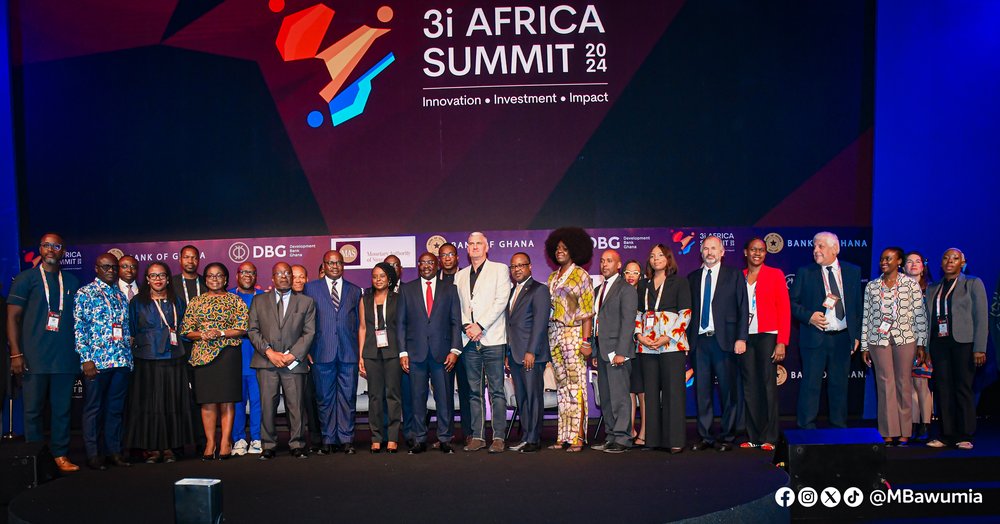The maiden 3i Africa Summit concluded in the Ghanaian capital of Accra late Wednesday, with participants calling for more investments to boost financial technology (fintech) and digital technology innovations in Africa for inclusive development.
The three-day summit, a brainchild of the Bank of Ghana, the Development Bank of Ghana, and the Monetary Authority of Singapore, focused on innovation, investment, and impact in digital technology under the theme “Unleashing Africa’s Fintech and Digital Economic Potential.”
The summit aimed to generate greater momentum and traction for Africa’s digital finance agenda by creating a platform for meetings between finance, policy, and technology.
In attendance were captains of budding African fintech companies, young innovators, students, academics, experts in digital technology across the African continent, central bank officials, and some politicians, including Dickon Mitchell, Prime Minister of Grenada.

Ghanaian President Nana Akufo-Addo with other dignitaries at the summit
One major theme running through discussions for the three days was investment in digital infrastructure, technology innovators, and small and medium enterprises (SMEs) to ignite growth in these sectors.
Ghanaian President Nana Addo Dankwa Akufo-Addo, guest of honor at the opening, stressed the need for African countries to invest in fintech development and the digital economy to accelerate the pace of transformation on the continent.
Akufo-Addo posited that a strong fintech and digital innovation landscape would help Africans fully benefit from the African Continental Free Trade Area (AfCFTA).
The Ghanaian president lauded the transformative potential of modern technologies in reshaping Africa’s economic landscape, adding that investors and innovators from across Africa are poised in their ambitions to harness financial technology as a catalyst for economic growth and development on the continent.
“We must take full advantage of the developments of our times by embracing the technologies that are reshaping the global economy and making them work for us. This calls for proactive engagements among policymakers, innovators, and investors,” Akufo-Addo stated.
Opening the conference, Bank of Ghana Governor Ernest Addison highlighted the growing population of technology-savvy young people on the continent as an advantage for Africa in the field of technology innovation.

BoG Governor Ernest Addison opening the summit
Addison noted: “The high mobile phone penetration, the consistent expansion of mobile network access, coupled with the rising homegrown fintech solutions, are other complementary factors providing fertile grounds to accelerate the digitalization agenda across the continent.”
We stand on the precipice of a global digital era, especially with artificial intelligence, and there is now a sense of urgency for us to accelerate the digitalization agenda through innovation, investment, and impactful policies to boost economic growth and development, said Addison.
“While we are hopeful, it is important to note that a lack of requisite investments in African fintechs could slow the pace of innovation and the scalability of solutions in achieving the desired impact of a digitized Africa,” he stressed.
On his part, Stephen Blewett, Chief Executive Officer of MTN Ghana, a leading telecommunications company, said the African fintech ecosystem has become a driving force towards a digital revolution.

Stephen Blewett believes fintechs will deepen financial inclusion in Africa
“Africa’s fintech ecosystem is the engine that will drive the digital revolution and economic development in the coming years,” Blewett stated.
He said the success mobile money transfers in Africa, spearheaded by MTN, Vodafone, and Safaricom, provide sufficient evidence of the ability of fintech to revolutionize business on the continent and provide millions of people with access to essential financial services.
The MTN official said these successes are enough evidence that fintech can stimulate local economies and drive progress across the continent in many ways.
Financial inclusion, innovation and entrepreneurship, job creation, cross-border transactions and payments, digital identity and security, agriculture and rural development, government services, investment, and funding, as well as digital and financial literacy, will all benefit from a robust and innovative fintech ecosystem, said Blewett.
“Despite these gains, Africa is far behind the world in mobile adoption and innovation. Constraints such as low infrastructure coverage, affordability of data and smartphones, and lack of digital skills training continue to inhibit access to the Internet among vulnerable groups, especially women,” Blewett pointed out.
He urged, “We must therefore make every effort to remove these bottlenecks and close the usage gap by improving data coverage, lowering the cost of data and data-enabled devices, especially in rural and low-income areas, and enhancing digital literacy.”

Wamkele Mene also urged critical investments into digital technology to drive growth on the continent
Wamkele Mene, secretary-general of the AfCFTA Secretariat, underscored the need for African businesses to leverage fintech to maximize outputs, urging governments across the continent to deploy all the technological resources available to propel growth and sustainability in their respective economies. “The existential economic sovereignty of our continent is the reason the African Continental Free Trade Area came into being, so that we can leverage this market of 1.4 billion people. But if we fail to deploy these digital technologies, all of us are going to be discussing where we got it wrong.” Mene cautioned.

